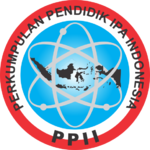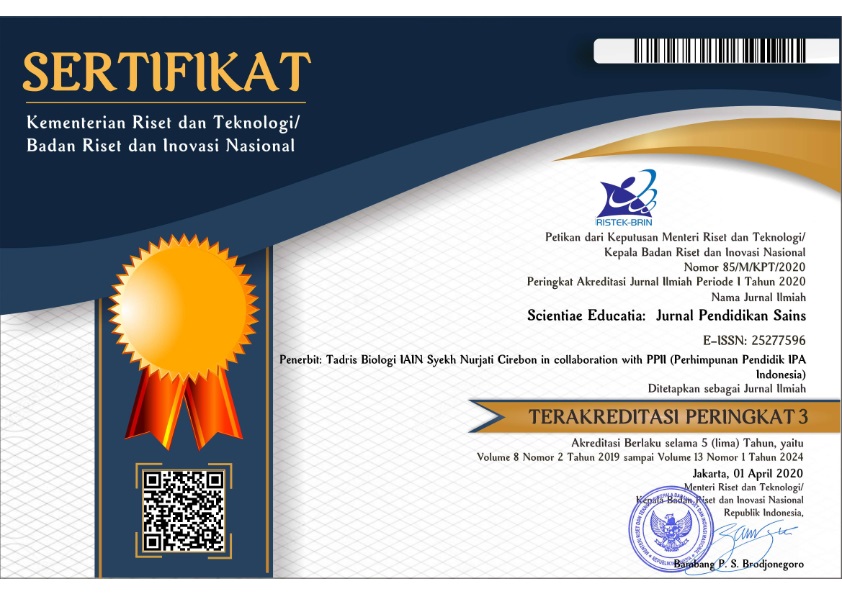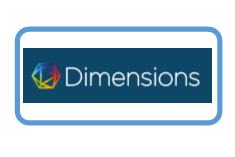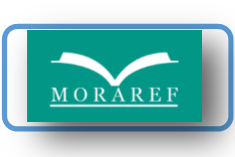Education for Sustainable Development in Science Classrooms: A Bibliometric Analysis and Literature Review
(1) Universitas Pendidikan Indonesia
(2) Universitas Pendidikan Indonesia
(3) Universitas Pendidikan Indonesia
(*) Corresponding Author
Abstract
Keywords
References
Abdurrahman, A., Maulina, H., Nurulsari, N., Sukamto, I., Umam, A. N., & Mulyana, K. M. (2023). Impacts of integrating engineering design process into STEM makerspace on renewable energy unit to foster students’ system thinking skills. Heliyon, 3.
Acharya, K. P. (2023). Gardening at School for New Good Life : Entrepreneurship for Sustainable Education in the Public Schools in Nepal Gardening at School for New Good Life : Entrepreneurship for Sustainable. The Qualitative Report, 28(6), 1817–1834.
Ali, R., Bhadra, J., Siby, N., Ahmad, Z., & Al-thani, N. J. (2021). A STEM Model to Engage Students in Sustainable Science Education through Sports : A Case Study in Qatar. Sustainability (Switzerland), 13(6).
Astuti, S. R. D., Firdausi, S., & Wahyuni, S. (2023). Analisis Bibliometrik : Trend Penelitian Hubungan Kemampuan Berpikir Kiritis terhadap Kesadaran Lingkungan pada Pembelajaran IPA. ScienceEdu, 6(2), 139–149.
Azhar, S. N. F. S., Akib, N. A. M., Sibly, S., & Mohd, S. (2022). Students ’ Attitude and Perception towards Sustainability: The Case of Universiti Sains Malaysia. Sustainability (Switzerland), 14(7).
Bucea-Manea-ÈšoniÅŸ, R., Bucea-Manea-ÈšoniÅŸ, R., Simion, V. E., Ilic, D., Braicu, C., & Manea, N. (2020). Sustainability in Higher Education : The Relationship between Work-Life Balance and XR E-Learning Facilities. Sustainability, 12(14).
Costa, M. C., Ferreira, C. A. F., & Pinho, H. J. O. (2023). Physics of Sound to Raise Awareness for Sustainable Development Goals in the Context of STEM Hands-On Activities. Sustainability (Switzerland), 15(4).
Ferguson, T. (2019). Climate Change Education for Sustainable Development. In W. L. Filho (Ed.), Encyclopedia of Sustainability in Higher Education (pp. 1–8). Springer Nature Switzerland AG.
Filter, E., Eckes, A., Fiebelkorn, F., & Büssing, A. G. (2020). Virtual Reality Nature Experiences Involving Wolves on YouTube : Presence , Emotions , and Attitudes in Immersive and Nonimmersive Settings. Sustainability, 12(9).
González-Zamar, M.-D., Abad-Segura, E., López-Meneses, E., & Gómez-Galán, J. (2020). Managing ICT for Sustainable Education : Research Analysis in the Context of Higher Education. Sustainability, 12(9), 1–25.
Han, J., Kelley, T., & Knowles, J. G. (2023). Building a sustainable model of integrated stem education: investigating secondary school STEM classes after an integrated STEM project. International Journal of Technology and Design Education, 33(4), 1499–1523. https://doi.org/10.1007/s10798-022-09777-8
Howell, R. A. (2021). Engaging students in education for sustainable development: The benefits of active learning, reflective practices and flipped classroom pedagogies. Journal of Cleaner Production, 325. https://doi.org/https://doi.org/10.1016/j.jclepro.2021.129318
Hsiao, P.-W., & Su, C.-H. (2021). A Study on the Impact of STEAM Education for Sustainable Development Courses and Its Effects on Student Motivation and Learning. Sustainability, 13(7).
Indriyanti, F., Fauziah, T. N., & Nuryadin, A. (2023). Analisis Bibliometrik Penggunaan Video Pembelajaran di Sekolah Dasar Tahun 2013-2022 Menggunakan Aplikasi VosViewer. Jurnal Educatio, 9(1), 23–31. https://doi.org/10.31949/educatio.v9i1.3906
Kioupi, V., & Voulvoulis, N. (2019). Education for Sustainable Development: A Systemic Framework for Connecting the SDGs to Educational Outcomes. Sustainability, 11. https://doi.org/10.3390/su11216104
Kulshreshtha, P., Gupta, S., Shaikh, R., Aggarwal, D., & Sharma, D. (2022). Foldscope Embedded Pedagogy in Stem Education : A Case Study of SDG4 Promotion in India. Sust, 14(20), 1–16.
Kurdi, M. S., & Kurdi, M. S. (2021). Analisis Bibliometrik dalam Penelitian Bidang Pendidikan: Teori dan Implementasi. Journal on Education, 03(04), 518–537.
Lestari, H., Rahmawati, I., Ali, M., Sopandi, W., & Wulan, A. R. (2023). Trends of ESD Oriented RADEC Learning Model in Elementary Education : Review and Bibliometric Analysis. Jurnal Penelitian Pendidikan IPA, 9(10), 766–775. https://doi.org/10.29303/jppipa.v9i10.3785
Lorenz, T., Gerster, L., Wodzinowski, D. E., Wartenberg, A., Martetschläger, L., Molitor, H., Cremer, T., & Bloch, R. (2022). Innovative Teaching and Learning Formats for the Implementation of Agroforestry Systems — An Impact Analysis after Five Years of Experience with the Real-World Laboratory “Ackerbaum.†Forest, 13(7).
Manasia, L., Ianos, M. G., & Chicioreanu, T. D. (2020). Pre-Service Teacher Preparedness for Fostering Education for Sustainable Development : An Empirical Analysis of Central Dimensions of Teaching Readiness. Sustainability, 12(1), 4–6.
Mulero, L., Cunill, J., Grau, M. D., & Mancho, F. (2022). Studying Forests in an Open Schooling Project. Journal of Technology and Science Education, 12(2). https://doi.org/https://doi.org/10.3926/jotse.1461
Nuwangi, P. P. (2022). Pengaruh Pembelajaran Berbasis Future Workshop terhadap Anticipatory Competency dan Intensi Prolingkungan Siswa Sekolah Menengah Atas dalam Isu Perubahan Iklim [Indonesia University of Education]. http://repository.upi.edu/80748/
Nuwangi, P. P., Nahadi, Anwar, S., & Riandi. (2023). Penerapan Nilai-nilai Berkelanjutan dalam Pendidikan Perubahan Iklim: Sebuah Kajian Epistemologi dan Aksiologi. Paradigma: Jurnal Filsafat, Sains, Teknologi, Dan Sosial-Budaya, 29(5), 80–88.
Ojala, M. (2017). Hope and anticipation in education for a sustainable future. Futures, 94, 76–84. https://doi.org/10.1016/j.futures.2016.10.004
Pardo-Garcia, C., & Barac, M. (2020). Promoting Employability in Higher Education : A Case Study on Boosting Entrepreneurship Skills. Sustainability, 12(10).
Perwitasari, S. I., Hariyono, E., & Susantini, E. (2023). Implementation of ESD (Education for Sustainable Development) in Climate Change Learning : A Literature Review. 4(4), 399–415.
Pocol, C. B., Stanca, L., Dabija, D., & Pop, I. D. (2022). Knowledge Co-creation and Sustainable Education in the Labor Market-Driven University – Business Environment. Frontiers in Environmental Science, 10(February), 1–15. https://doi.org/10.3389/fenvs.2022.781075
Scherak, L., & Rieckmann, M. (2020). Developing ESD competences in higher education institutions—Staff training at the University of Vechta. Sustainability (Switzerland), 12(24), 1–19. https://doi.org/10.3390/su122410336
Septiyanto, A., Ashidiq, R. M., & Prima, E. C. (2022). INVESTIGASI TREN PENELITIAN PENDIDIKAN STEM : ANALISIS BIBLIOMETRIK DARI TAHUN 2018-2022. 649–665.
Sund, P., & Gericke, N. (2020). Teaching contributions from secondary school subject areas to education for sustainable development – a comparative study of science , social science and language teachers. Environmental Education Research, 26(5–6), 772–794. https://doi.org/10.1080/13504622.2020.1754341
Taber, K. S. (2017). Reflecting the Nature of Science in Science Education. In K. S. Taber & B. Akpan (Eds.), Science Education: An International Course Companion (pp. 23–37). SensePublishers Rotterndam.
Tran, T., Hoang, A., Nguyen, Y., Nguyen, L., & Ta, N. (2020). Toward Sustainable Learning during School Suspension : Socioeconomic , Occupational Aspirations , and Learning Behavior of Vietnamese Students during COVID-19. Sustainability (Switzerland), 4.
Tristananda, P. W. (2018). Membumikan education for sustainable development (ESD) di Indonesia dalam menghadapi isu-isu global. Purwadita : Jurnal Agama Dan Budaya, 2(2), 42–49. http://jurnal.stahnmpukuturan.ac.id/index.php/Purwadita/article/view/86
UNESCO. (2017). Education for Sustainable Development Goals: Learning Objectives. UNESCO.
UNESCO. (2018). Education for Sustainable Development and the SDGs: Learning to Act, Learning to Achieve. In UNESCO Global Action Programme on Education for Sustainability Development.
Valenci, M. I. C. (2018). Introducing Education for Sustainable Development (ESD) in The Educational Institutions in The Philippines. Journal of Sustainable Development Education and Research, 2(1), 51–57.
Vilmala, B. K., Kaniawati, I., Suhandi, A., & Permanasari, A. (2022). A Literature Review on Education for Sustainable Development (ESD) in Science Learning : What, Why, and How. 5(1), 35–44. https://doi.org/10.24014/jnsi.v5i1.15342
Warlenius, R. H. (2022). Learning for life : ESD , ecopedagogy and the new spirit of capitalism. The Journal of Environmental Education, 53(3), 141–153. https://doi.org/10.1080/00958964.2022.2070102
Widodo, A., Riandi, Sriyati, S., Purwianingsih, W., Rochintaniawati, D., Solihat, R., & Siswandari, P. (2023). Pengembangan Nilai-nilai Keberlanjutan dalam Pelajaran Sains. UPI Press.
Wiek, A., Withycombe, L., & Redman, C. L. (2011). Key competencies in sustainability: A reference framework for academic program development. Sustainability Science, 6(2), 203–218. https://doi.org/10.1007/s11625-011-0132-6
Yani, N. F., & Soebagyo, J. (2023). Bibliometric Analysis of Mathematical Communication Skills Using Scopus Database. Jurnal Pendidikan Matematika Dan IPA, 14(1), 57–68.
Zidny, R., & Eilks, I. (2022). Learning about Pesticide Use Adapted from Ethnoscience as a Contribution to Green and Sustainable Chemistry Education. Education Sciences, 12(4).
Zidny, R., Solfarina, S., Sari, R., Aisyah, S., & Eilks, I. (2021). Exploring Indigenous Science to Identify Contents and Contexts for Science Learning in Order to Promote Education for Sustainable Development. Education Sciences, 11(3).
DOI: 10.24235/sc.educatia.v13i1.16636
Article Metrics
Abstract view : 19 timesRefbacks
- There are currently no refbacks.
Scientiae Educatia: Jurnal Pendidikan Sains indexed by:

This work is licensed under a Creative Commons Attribution 4.0 International License.
Stat Counter (Link)



1.png)












